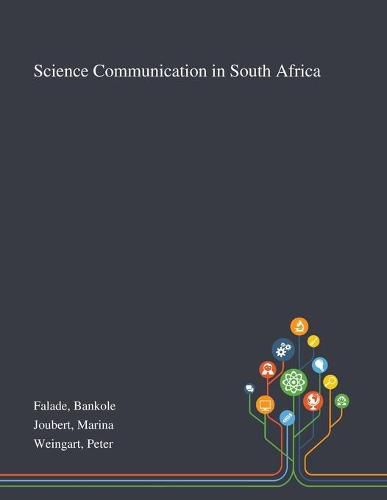Science Communication in South Africa
Bankole Falade,Marina Joubert,Peter Weingart

Science Communication in South Africa
Bankole Falade,Marina Joubert,Peter Weingart
This title is printed to order. This book may have been self-published. If so, we cannot guarantee the quality of the content. In the main most books will have gone through the editing process however some may not. We therefore suggest that you be aware of this before ordering this book. If in doubt check either the author or publisher’s details as we are unable to accept any returns unless they are faulty. Please contact us if you have any questions.
Why do we need to communicate science? Is science, with its highly specialised language and its arcane methods, too distant to be understood by the public? Is it really possible for citizens to participate meaningfully in scientific research projects and debate? Should scientists be mandated to engage with the public to facilitate better understanding of science? How can they best communicate their special knowledge to be intelligible? These and a plethora of related questions are being raised by researchers and politicians alike as they have become convinced that science and society need to draw nearer to one another. Once the persuasion took hold that science should open up to the public and these questions were raised, it became clear that coming up with satisfactory answers would be a complex challenge. The inaccessibility of scientific language and methods, due to ever increasing specialisation, is at the base of its very success. Thus, translating specialised knowledge to become understandable, interesting and relevant to various publics creates particular perils. This is exacerbated by the ongoing disruption of the public discourse through the digitisation of communication platforms. For example, the availability of medical knowledge on the internet and the immense opportunities to inform oneself about health risks via social media are undermined by the manipulable nature of this technology that does not allow its users to distinguish between credible content and misinformation. In countries around the world, scientists, policy-makers and the public have high hopes for science communication: that it may elevate its populations educationally, that it may raise the level of sound decision-making for people in their daily lives, and that it may contribute to innovation and economic well-being. This collection of current reflections gives an insight into the issues that have to be addressed by research to reach these noble goals, for South Africa and by South Africans in particular. This work was published by Saint Philip Street Press pursuant to a Creative Commons license permitting commercial use. All rights not granted by the work’s license are retained by the author or authors.
This item is not currently in-stock. It can be ordered online and is expected to ship in 7-14 days
Our stock data is updated periodically, and availability may change throughout the day for in-demand items. Please call the relevant shop for the most current stock information. Prices are subject to change without notice.
Sign in or become a Readings Member to add this title to a wishlist.


